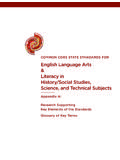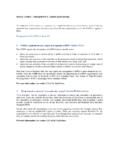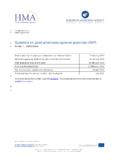Transcription of ARTICLE 29 DATA PROTECTION WORKING PARTY
1 ARTICLE 29 DATA PROTECTION WORKING PARTY This WORKING PARTY was set up under ARTICLE 29 of Directive 95/46/EC. It is an independent European advisory body on data PROTECTION and privacy. Its tasks are described in ARTICLE 30 of Directive 95/46/EC and ARTICLE 15 of Directive 2002/58/EC. The secretariat is provided by Directorate D (Fundamental Rights and Citizenship) of the European Commission, Directorate General Justice, Freedom and Security, B-1049 Brussels, Belgium, Office No LX-46 01/190. Website: 00264/10/EN WP 169 Opinion 1/2010 on the concepts of "controller" and "processor" Adopted on 16 February 2010 TABLE OF CONTENTS Executive summary.
2 1 I. II. General observations and policy Role of concepts ..4 Relevant context ..6 Some key challenges ..7 III. Analysis of Definition of controller ..7 ) Preliminary element: "determines" ..8 ) Third element: purposes and means of processing ..12 ) First element: natural person, legal person or any other body ..15 ) Second element: alone or jointly with others ..17 Definition of processor ..24 Definition of third IV. 1 Executive summary The concept of data controller and its interaction with the concept of data processor play a crucial role in the application of Directive 95/46/EC, since they determine who shall be responsible for compliance with data PROTECTION rules, how data subjects can exercise their rights, which is the applicable national law and how effective Data PROTECTION Authorities can operate.
3 Organisational differentiation in the public and in the private sector, the development of ICT as well as the globalisation of data processing, increase complexity in the way personal data are processed and call for clarifications of these concepts, in order to ensure effective application and compliance in practice. The concept of controller is autonomous, in the sense that it should be interpreted mainly according to Community data PROTECTION law, and functional, in the sense that it is intended to allocate responsibilities where the factual influence is, and thus based on a factual rather than a formal analysis.
4 The definition in the Directive contains three main building blocks: - the personal aspect ("the natural or legal person, public authority, agency or any other body"); - the possibility of pluralistic control ("which alone or jointly with others"); and - the essential elements to distinguish the controller from other actors ("determines the purposes and the means of the processing of personal data"). The analysis of these building blocks leads to a number of conclusions that have been summarized in paragraph IV of the opinion. This opinion also analyzes the concept of processor, the existence of which depends on a decision taken by the controller, who can decide either to process data within his organization or to delegate all or part of the processing activities to an external organization.
5 Two basic conditions for qualifying as processor are on the one hand being a separate legal entity with respect to the controller and on the other hand processing personal data on his behalf. The WORKING PARTY recognises the difficulties in applying the definitions of the Directive in a complex environment, where many scenarios can be foreseen involving controllers and processors, alone or jointly, with different degrees of autonomy and responsibility. In its analysis, it has emphasized the need to allocate responsibility in such a way that compliance with data PROTECTION rules will be sufficiently ensured in practice.
6 However, it has not found any reason to think that the current distinction between controllers and processors would no longer be relevant and workable in that perspective. The WORKING PARTY therefore hopes that the explanations given in this opinion, illustrated with specific examples taken from the daily experience of data PROTECTION authorities, will contribute to effective guidance on the way to interpret these core definitions of the Directive. 2 The WORKING PARTY on the PROTECTION of Individuals with regard to the processing of personal data set up by Directive 95/46/EC of the European Parliament and of the Council of 24 October 1995, having regard to Articles 29 and 30 paragraphs 1(a) and 3 of that Directive, and ARTICLE 15 paragraph 3 of Directive 2002/58/EC of the European Parliament and of the Council of 12 July 2002, having regard to its Rules of Procedure, has adopted the following opinion: I.
7 Introduction The concept of data controller and its interaction with the concept of data processor play a crucial role in the application of Directive 95/46/EC, since they determine who shall be responsible for compliance with data PROTECTION rules, and how data subjects can exercise their rights in practice. The concept of data controller is also essential for the determination of the applicable national law and the effective exercise of the supervisory tasks conferred on Data PROTECTION Authorities. It is therefore of paramount importance that the precise meaning of these concepts and the criteria for their correct use are sufficiently clear and shared by all those in the Member States who play a role in the implementation of the Directive and in the application, evaluation and enforcement of the national provisions that give effect to it.
8 There are signs that there may be a lack of clarity, at least as to certain aspects of these concepts, and some divergent views among practitioners in different Member States that may lead to different interpretations of the same principles and definitions introduced for the purpose of harmonisation at European level. This is why the ARTICLE 29 WORKING PARTY has decided, as part of its strategic work programme for 2008-2009, to devote special attention to the elaboration of a document setting out a common approach to these issues. The WORKING PARTY recognizes that the concrete application of the concepts of data controller and data processor is becoming increasingly complex.
9 This is mostly due to the increasing complexity of the environment in which these concepts are used, and in particular due to a growing tendency, both in the private and in the public sector, towards organisational differentiation, in combination with the development of ICT and globalisation, in a way that may give rise to new and difficult issues and may sometimes result in a lower level of PROTECTION afforded to data subjects. Although the provisions of the Directive have been formulated in a technology-neutral way and so far were able to resist well to the evolving context, these complexities may indeed lead to uncertainties with regard to the allocation of responsibility and the scope of applicable national laws.
10 These uncertainties may have a negative effect on compliance with data PROTECTION rules in critical areas, and on the effectiveness of data PROTECTION law as a whole. The WORKING PARTY has already dealt with some of these issues 3in relation to specific questions1, but deems it necessary now to give more developed guidelines and specific guidance in order to ensure a consistent and harmonised approach. Therefore, the WORKING PARTY has decided to provide in this opinion - in a similar way as already done in the Opinion on the concept of personal data2 - some clarifications and some concrete examples3 with respect to the concepts of data controller and data processor.








